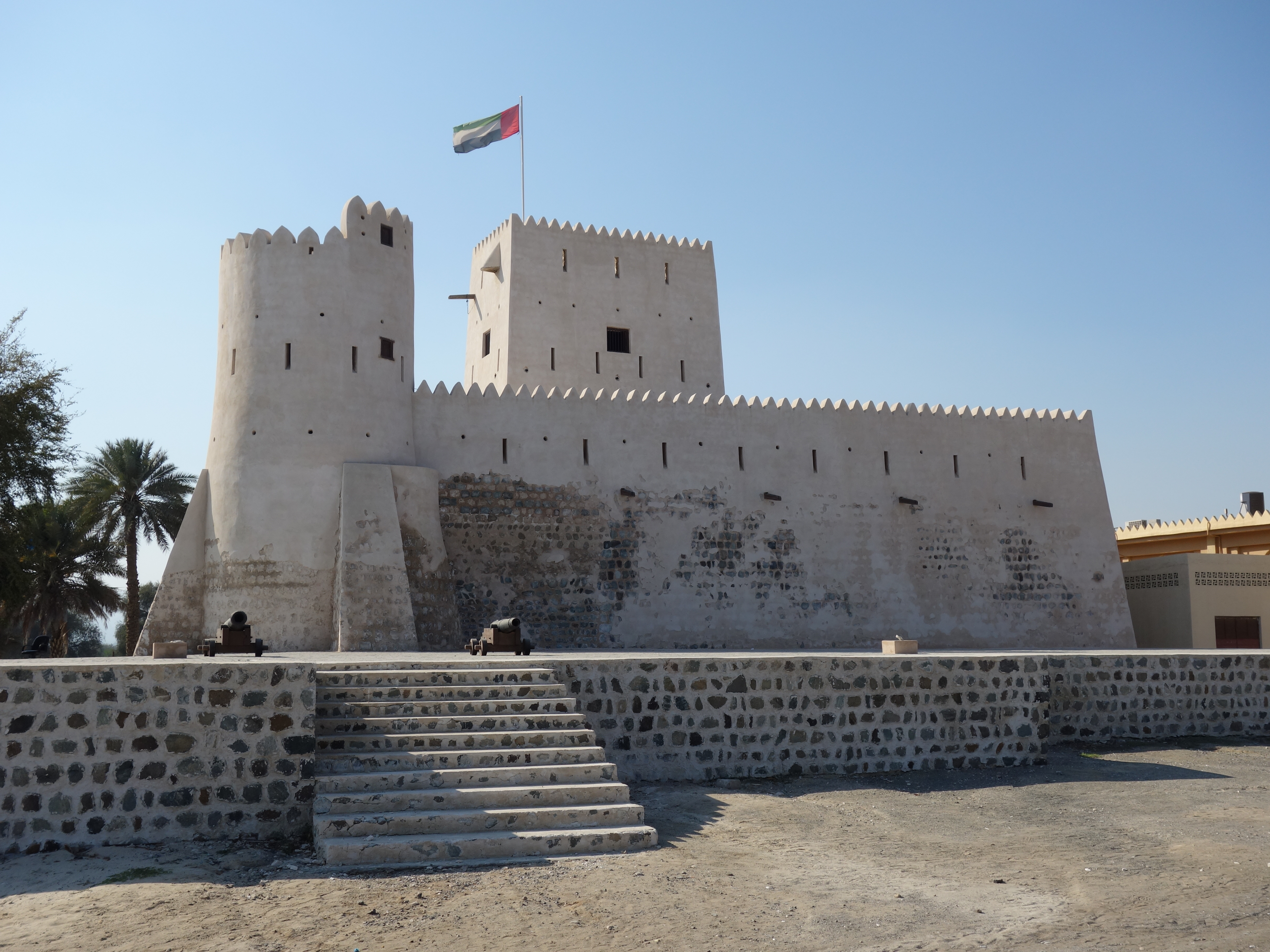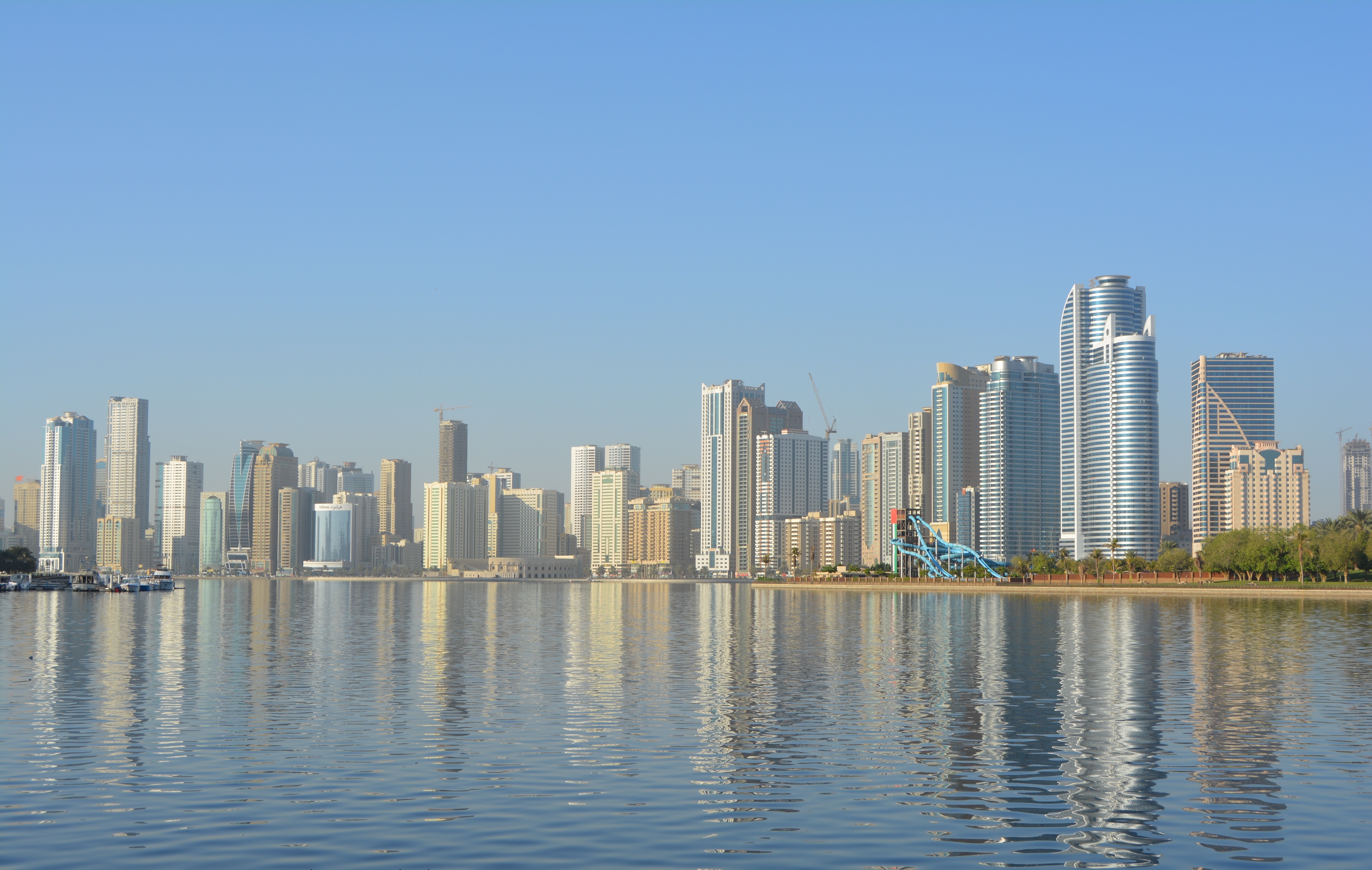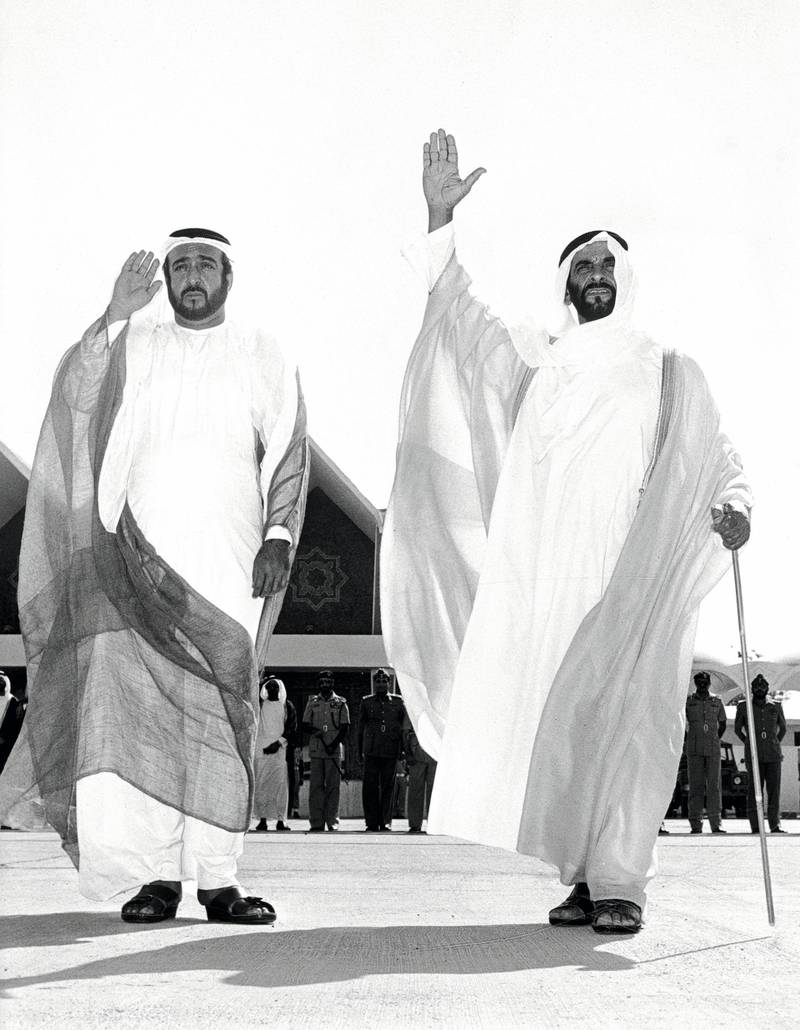|
Mohammed Bin Hamad Al Sharqi
Sheikh Mohammed bin Hamad Al Sharqi (1908 – 6 September 1974) was the Ruler of Fujairah, one of the emirates which today form the United Arab Emirates (UAE), from 1938–1974. In 1952 he was to see his father's long-held dream of independence for Fujairah recognised by the British, the last Trucial State to be so recognised, as well as shortly afterwards to help take the UAE to independence as a nation, in 1971. Due to his skills in diplomacy and politics he was called the wolf of the Gulf. Ruler of Fujairah Accession Mohammed bin Hamad succeeded as head of the Sharqiyin tribe and Sheikh of Fujairah in 1939 on the death of his elder brother, Saif bin Hamad, and immediately set about consolidating the Sharqiyin holdings of Fujairah and its surroundings. By 1950, he had won over Dibba to the North, as well as the coastal settlements of Bidayah and Sakamkam and the inland village of Al Bithnah the strategically important Al Bithnah Fort dominating the Wadi Ham. Trucial sta ... [...More Info...] [...Related Items...] OR: [Wikipedia] [Google] [Baidu] |
Sheikh
Sheikh (pronounced or ; ar, شيخ ' , mostly pronounced , plural ' )—also transliterated sheekh, sheyikh, shaykh, shayk, shekh, shaik and Shaikh, shak—is an honorific title in the Arabic language. It commonly designates a chief of a tribe or a royal family member in Arabian countries, in some countries it is also given to those of great knowledge in religious affairs as a surname by a prestige religious leader from a chain of Sufi scholars. It is also commonly used to refer to a Muslim religious scholar. It is also used as an honorary title by people claiming to be descended from Hasan ibn Ali and Husayn ibn Ali both patrilineal and matrilineal who are grandsons of the Islamic prophet Muhammad. The term is literally translated to " Elder" (is also translated to "Lord/Master" in a monarchical context). The word 'sheikh' is mentioned in the 23rd verse of Surah Al-Qasas in the Quran. Etymology and meaning The word in Arabic stems from a triliteral root connected with a ... [...More Info...] [...Related Items...] OR: [Wikipedia] [Google] [Baidu] |
Kalba
Kalba () is a city in the Emirate of Sharjah in the United Arab Emirates (UAE). It is an exclave of Sharjah lying on the Gulf of Oman coast north of Oman. Khor Kalba (Kalba Creek), an important nature reserve and mangrove swamp, is located south of the town by the Omani border. Kalba Mangrove reserve is open to the public and was developed as an eco-tourism resort by the Sharjah Investment and Development Authority (Shurooq). A number of conservationists and ecologists have expressed concern regarding the project. History Shell middens dating back to the fourth millennium BCE have been found at Kalba, as well as extensive remains of Umm Al Nar era settlement. Portuguese The town was captured by the Portuguese Empire in the 16th century and was referred to as ''Ghallah''. It was part of a series of fortified cities that the Portuguese used to control access to the Persian Gulf and the Gulf of Oman, e.g. Khor Fakan, Muscat, Sohar, Seeb, Qurayyat, Muttrah. Kalba Fort, tod ... [...More Info...] [...Related Items...] OR: [Wikipedia] [Google] [Baidu] |
Umm Al-Quwain
Umm Al Quwain is the capital and largest city of the Emirate of Umm Al Quwain in the United Arab Emirates. The city is located on the peninsula of Khor Al Bidiyah, with the nearest major cities being Sharjah to the southwest and Ras Al Khaimah to the northeast. There are mangroves A mangrove is a shrub or tree that grows in coastal saline or brackish water. The term is also used for tropical coastal vegetation consisting of such species. Mangroves are taxonomically diverse, as a result of convergent evolution in severa ... outside the city along the coast, with the local economy being largely fishing. References Populated places in Umm Al Quwain Cities in the United Arab Emirates Umm Al Quwain {{UnitedArabEmirates-geo-stub ... [...More Info...] [...Related Items...] OR: [Wikipedia] [Google] [Baidu] |
Ajman
Ajman ( ar, عجمان, '; Gulf Arabic: عيمان ʿymān) is the capital of the emirate of Ajman in the United Arab Emirates. It is the fifth-largest city in UAE after Dubai, Abu Dhabi, Sharjah and Al Ain. Located along the Persian Gulf, it is engulfed by the larger emirate of Sharjah in territory. History Al Bu Kharaiban Nuaimi rule in Ajman started in 1816, when Sheikh Rashid bin Humaid Al Nuaimi and fifty of his followers took the coastal settlement of Ajman from members of the Al Bu Shamis Nuaimi tribe in a short conflict. It wasn't until 1816 or 1817, however, that the Ajman fort finally fell to Rashid's followers and his rule was endorsed by the powerful Sheikh of neighbouring Sharjah and Ras Al Khaimah, Sheikh Sultan bin Saqr Al Qasimi. On 8 January 1820, following the sack of Ras Al Khaimah by a British force led by Sir W.G. Keir, Sultan bin Saqr signed the General Maritime Treaty with the United Kingdom on 4 February 1820, followed on 15 March by Rashid bin Humaid ... [...More Info...] [...Related Items...] OR: [Wikipedia] [Google] [Baidu] |
Sharjah
Sharjah (; ar, ٱلشَّارقَة ', Gulf Arabic: ''aš-Šārja'') is the third-most populous city in the United Arab Emirates, after Dubai and Abu Dhabi, forming part of the Dubai-Sharjah-Ajman metropolitan area. Sharjah is the capital of the eponymous emirate. The emirate shares legal, political, military and economic functions with the other emirates of the UAE within a federal framework, although each emirate has jurisdiction over some functions such as civil law enforcement and provision and upkeep of local facilities. Sharjah has been ruled by the Al Qasimi dynasty since the 18th century. The city is a centre for culture and industry, and alone contributes 7.4% of the GDP of the United Arab Emirates. The city covers an approximate area of 235 km2 and has a population of over 800,000 (2008). The sale or consumption of alcoholic beverages is prohibited in the emirate of Sharjah without possession of an alcohol licence and alcohol is not served in hotels, restaura ... [...More Info...] [...Related Items...] OR: [Wikipedia] [Google] [Baidu] |
Rashid Bin Saeed Al Maktoum
Sheikh Rashid bin Saeed Al Maktoum ( ar, ٱلـشَّـيْـخ رَاشِـد بِـن سَـعِـيْـد آل مَـكْـتُـوْم, Ash-Shaykh Rāshid bin Sa`īd Āl Maktūm; 11 June 1912 – 7 October 1990) was the vice president and second prime minister of the United Arab Emirates and ruler of Dubai. He ruled Dubai for 32 years from 1958 until his death in 1990. Development of Dubai Sheikh Rashid was responsible for the transformation of Dubai from a small cluster of settlements near the Dubai Creek to a modern port city and commercial hub. A quote commonly attributed to Sheikh Rashid reflected his concern that Dubai's oil, which was discovered in 1966 and which began production in 1969, would run out within a few generations. "My grandfather rode a camel, my father rode a camel, I drive a Mercedes, my son drives a Land Rover, his son will drive a Land Rover, but his son will ride a camel",While the following quote is commonly attributed to Sheikh Rashid, it i ... [...More Info...] [...Related Items...] OR: [Wikipedia] [Google] [Baidu] |
Zayed Bin Sultan Al Nahyan
Sheikh Zayed bin Sultan Al Nahyan ( ar, زَايِد بِن سُلْطَان آل نَهْيَان, Zāyed bin Sulṭān Āl Nahyān; 6 May 1918 – 2 November 2004) was an Emirati politician, statesman, and philanthropist who served as the first president of the United Arab Emirates (UAE) from 1971 until his death in 2004. He is credited as the founding father and the principal driving force behind the formation of the UAE, uniting seven emirates. He was also the ruler of Abu Dhabi from 1966 until his death. Zayed replaced his older brother Sheikh Shakhbut bin Sultan as the ruler of Abu Dhabi on 6 August 1966 after Shakhbut was deposed through a bloodless coup by members of the ruling family with British support. Family and early life Zayed was the youngest of four sons of Sheikh Sultan bin Khalifa Al Nahyan. His father was the ruler of Abu Dhabi from 1922 until his death in 1926. Zayed was the youngest of his four brothers. His eldest brother, Sheikh Shakhbut bin Sul ... [...More Info...] [...Related Items...] OR: [Wikipedia] [Google] [Baidu] |
Emirate Of Abu Dhabi
The Emirate of Abu Dhabi (, , or ; ar, إِمَارَةْ أَبُوظَبِي , ) is one of seven emirates that constitute the United Arab Emirates (UAE). It is by far the largest emirate, accounting for 87% of the nation's total land area or 67,340 km2 (or 26,000 sq mi). Abu Dhabi also has the second-largest population of the seven emirates. In June 2011 this was estimated to be 2,120,700 people, of which 439,100 people (less than 21%) were Emirati citizens. The city of Abu Dhabi, after which the emirate is named, is the capital of both the emirate and federation. In the early 1970s, two important developments influenced the status of the Emirate of Abu Dhabi. The first was the establishment of the United Arab Emirates in December 1971, with Abu Dhabi as its political and administrative capital. The second was the sharp increase in oil prices following the October 1973 War, which accompanied a change in the relationship between the oil countries and foreign oil companies, ... [...More Info...] [...Related Items...] OR: [Wikipedia] [Google] [Baidu] |
Bahrain
Bahrain ( ; ; ar, البحرين, al-Bahrayn, locally ), officially the Kingdom of Bahrain, ' is an island country in Western Asia. It is situated on the Persian Gulf, and comprises a small archipelago made up of 50 natural islands and an additional 33 artificial islands, centered on Bahrain Island which makes up around 83 percent of the country's landmass. Bahrain is situated between Qatar and the northeastern coast of Saudi Arabia, to which it is connected by the King Fahd Causeway. According to the 2020 census, the country's population numbers 1,501,635, of which 712,362 are Bahraini nationals. Bahrain spans some , and is the third-smallest nation in Asia after the Maldives and Singapore. The capital and largest city is Manama. Bahrain is the site of the ancient Dilmun civilization.Oman: The Lost Land [...More Info...] [...Related Items...] OR: [Wikipedia] [Google] [Baidu] |
Qatar
Qatar (, ; ar, قطر, Qaṭar ; local vernacular pronunciation: ), officially the State of Qatar,) is a country in Western Asia. It occupies the Qatar Peninsula on the northeastern coast of the Arabian Peninsula in the Middle East; it shares its sole land border with Saudi Arabia to the south, with the rest of its territory surrounded by the Persian Gulf. The Gulf of Bahrain, an inlet of the Persian Gulf, separates Qatar from nearby Bahrain. The capital is Doha, home to over 80% of the country's inhabitants, and the land area is mostly made up of flat, low-lying desert. Qatar has been ruled as a hereditary monarchy by the House of Thani since Mohammed bin Thani signed a treaty with the British in 1868 that recognised its separate status. Following Ottoman rule, Qatar became a British protectorate in 1916, and gained independence in 1971. The current emir is Tamim bin Hamad Al Thani, who holds nearly all executive and legislative authority under the Constitution of Qat ... [...More Info...] [...Related Items...] OR: [Wikipedia] [Google] [Baidu] |
Harold Wilson
James Harold Wilson, Baron Wilson of Rievaulx, (11 March 1916 – 24 May 1995) was a British politician who served as Prime Minister of the United Kingdom twice, from October 1964 to June 1970, and again from March 1974 to April 1976. He was the Leader of the Labour Party from 1963 to 1976, and was a Member of Parliament (MP) from 1945 to 1983. Wilson is the only Labour leader to have formed administrations following four general elections. Born in Huddersfield, Yorkshire, to a politically active middle-class family, Wilson won a scholarship to attend Royds Hall Grammar School and went on to study modern history at Jesus College, Oxford. He was later an economic history lecturer at New College, Oxford, and a research fellow at University College, Oxford. Elected to Parliament in 1945 for the seat of Ormskirk, Wilson was immediately appointed to the Attlee government as a Parliamentary Secretary; he became Secretary for Overseas Trade in 1947, and was elevated to the ... [...More Info...] [...Related Items...] OR: [Wikipedia] [Google] [Baidu] |
Perpetual Maritime Truce
The Perpetual Maritime Truce of 1853 was a treaty signed between the British and the Rulers of the Sheikhdoms of the Lower Gulf, later to become known as the Trucial States and today known as the United Arab Emirates. The treaty followed the effective subjugation of the Qawasim (singular Al Qasimi) maritime federation and other coastal settlements of the Lower Gulf by British forces following the Persian Gulf campaign of 1819, a punitive expedition mounted from Bombay which sailed against Ras Al Khaimah, and which resulted in the signing of the General Maritime Treaty of 1820. The Perpetual Maritime Truce was conceived by the British Political Resident in the Persian Gulf Colonel Samuel Hennell following a series of seasonal treaties intended to preserve peace at sea between the coastal communities of the region during the annual pearling season and was signed in August 1853 by the Rulers of the area during meetings at Basidu on the island of Qeshm and at Bushire. Backgroun ... [...More Info...] [...Related Items...] OR: [Wikipedia] [Google] [Baidu] |







.png)
